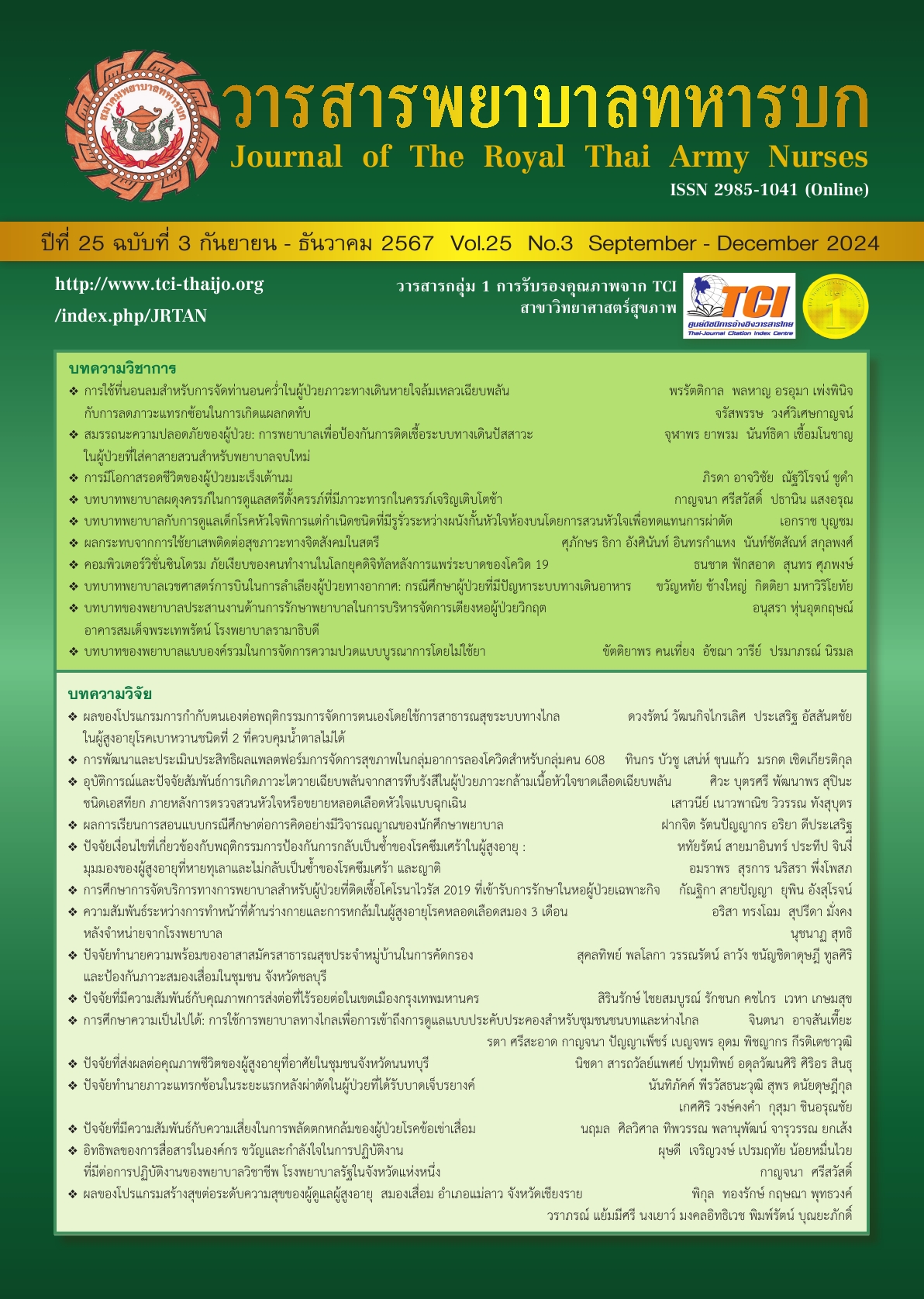Effects of Family Caregivers’ Preparedness Program on Preventing Aspiration in Older Patients with Dysphagia
Keywords:
dysphagia, older patients, family caregiversAbstract
This study aimed to examine the effects of family caregivers’ preparedness program on preventing aspiration in Thai older patients with dysphagia, a randomized control trial. The participants were family caregivers aged 20 years and above, male and female who take care of older patients are admitted in a private hospital in Bangkok. The participants were comprised of 42 family caregivers and randomly assigned to the two study group (n = 21 per group). There were 21 family caregivers in the control group who received routine nursing care and 21 family caregivers in the experimental groups who received routine nursing care and the preparedness program, 4-day program duration, 15-45 minutes each day. Data collection was performed by using demographic questionnaires, and the Preparation for Caregiving form. Descriptive statistics and t-test were used to analyze the data.
The results showed that the family Caregivers’ Preparedness Program on Preventing Aspiration in Older Patients with Dysphagia in the experimental group were significantly higher than those in the control group with statistical significance (t = 5.79, p = .00).
Since the patient has been admitted, nurses could encourage family to take part in caring to develop the competency and preparedness of caregivers from the hospital to home and to develop the role of nurses in caring for patients before discharge from the hospital to be more efficient.
Downloads
References
Charoensuk D. Contemporary aging and community health promotion. Journal of the Police Nurses. 2015); 7(2), 280-295. (in Thai)
Sirindhorn National Medical Rehabilitation Institute. Clinical Practice Guidelines: dysphagia. 1th ed. Nonthaburi: Sahamitr Printing And Publishing Company Limited; 2019. (in Thai)
Saiyot S. Prevalence of dysphagia in hospitalized stroke patients in Sisaket hospital. Medical Journal of Srisaket Surin Buriram Hospitals. 2018; 33(2); 119-28. (in Thai)
Carmen M, Alberto M, Graupera M, Arias O, Elvira A, Cabré M, et al. Prevalence, risk factors, and complications of oropharyngeal dysphagia in older patients with dementia. Nutrients. 2020; 12; 863-77.
Ortega O, Martín A, Clavé P. Diagnosis and management of oropharyngeal dysphagia among older persons, state of the art. Journal of the American Medical Directors Association. 2017; 18; 576-82.
Kasemkijwattana S, Praison P. Family caregivers chronic disease. Thai Journal of Nursing Council. 2014; 29(4); 22-31. (in Thai)
Archbold S, Lutman M, Marshall D. Categories of auditory performance. Annals of Otology, Rhinology & Laryngology. 1995; 104; 312-14.
Schumacher K, Stewart B, Archbold P, Caparro M, Mutale F, Agrawal S. Effects of caregiving demand, mutuality, and preparedness on family caregiver outcome during cancer treatment. Oncology Nursing Forum. 2008; 35(1); 49-56.
National Statistical Office. Report on the 2017 survey of the older persons in Thailand. 1thed. Bangkok: Statistical Forecasting Division; 2017. (in Thai)
Mohammadi S, Zabolypour S, Ghaffari F, Arazi T. The effect of family-oriented discharge program on the level of preparedness for care-giving and stress experienced by the family of stroke survivors. Iranian Rehabilitation Journal. 2019; 17(2); 113-19.
Trapl M, Enderle P, Nowotny M, Teuschl Y, Matz K, Dachenhausen A, Brainin M. Dysphagia Bedside Screening for Acute-Stroke Patients; The Gugging Swallowing Screen. Journal of the American Heart Association. 2007; 38; 2948-52
Trongsakul S, Lambert R, Clark A, Wongpakaran N ,Cross J. Development of the Thai version of Mini-Cog, a brief cognitive screening test. Geriatr Gerontol Int. 2015; 15(5); 594-600. in Thai)
Wirojratana V. Development of the Thai family care inventory [dissertation]. Portland, OR: Oregon Health & Science University; 2002.
Surakan P, Jongudomkarn D. The family caregiver’s roles in providing care for chronically the ill family members: A synthesis of qualitative research theses. Journal of the Office of DPC 7 Khon Kaen. 2019); 26(2); 83-92. (in Thai)
Pettakon S, Teerawanviwat D. Risk of catastrophic health expenditures among Thai elderly. KKU Research Journal. 2019; 19(3); 36-47. (in Thai)
Piriyajaratchai N, Sasat S. Factors predicting caregiver’s readiness for dependent older persons in transition period on hospital to home. Journal of The Royal Thai Army Nurses. 2018; 19(3); 231-40. (in Thai)
Sutthirit S, Yuangthong A, Chanead W, Niyomjit S, Bueasang N, Rodcharoen S. Stress of caregivers providing care for bedridden elderly, Surat Thani Province. Reg11med. 2021; 35(2); 1-12. (in Thai)
Laplai P, Wongvatunyu S, Sirapo-ngam Y. The effects of the program to promote safe eating in stroke patients on family caregivers knowledge, self-efficacy, outcome expectation, family caregivers satisfaction, and safe eating in stroke patients. Ramathibodi Nursing Journal. 2017; 9(2); 78-98. (in Thai)
Downloads
Published
How to Cite
Issue
Section
License
Copyright (c) 2024 Journal of The Royal Thai Army Nurses

This work is licensed under a Creative Commons Attribution-NonCommercial-NoDerivatives 4.0 International License.
บทความหรือข้อคิดเห็นใดใดที่ปรากฏในวารสารพยาบาลทหารบกเป็นวรรณกรรมของผู้เขียน ซึ่งบรรณาธิการหรือสมาคมพยาบาลทหารบก ไม่จำเป็นต้องเห็นด้วย
บทความที่ได้รับการตีพิมพ์เป็นลิขสิทธิ์ของวารสารพยาบาลทหารบก
The ideas and opinions expressed in the Journal of The Royal Thai Army Nurses are those of the authors and not necessarily those
of the editor or Royal Thai Army Nurses Association.






